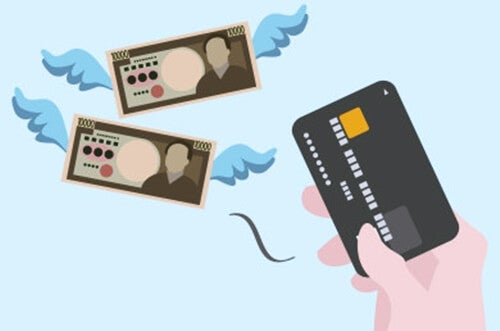Living in the Red: A Lack of Vision for the Future?

Living in the red often has to do with an inability to save money for future expenses. It’s like the bills are burning in our wallets and purses. As soon as a person has some money, they start thinking about what to spend it on. It’s as if they need to burn their income as soon as possible in order to stay in the red, or at least on the borderline.
From the outside, it can give the person the feeling that they’re living on the edge. They have a chronic inability to save. They can’t stand the idea of putting money away. Thus, they often spend it on unnecessary or irrelevant things. There’s a certain similarity to compulsive buying disorder.
However, experts say that saving is a critical factor in order to improve your quality of life, especially for those who don’t have a high income. In other words, when you have little income, the “saving” you’ll experience in your quality of life makes a great difference. It seems contradictory, but it’s true. By saving, you’re exerting control over your life, especially for the future. When you choose to live in the red, then the opposite effect occurs.
“Beware of little expenses. A small leak will sink a great ship.”
-Benjamin Franklin-
Money and living in the red
A healthy relationship with money is one in which you balance what you earn, invest, and spend. This also includes clarity about spending priorities and taking into account your medium and long-term financial situation. When you combine all these factors correctly, it shows that you have a healthy attitude in relation to money.
However, people who live life in the red have a confusing perspective on all of this. The traits or symptoms that define this condition include the following:
- Frequent gift shopping. Buying yourself gifts to reward yourself for something or buying gifts for others without any specific reason.
- You know you have a lot of debt but you choose not to think about it so you don’t worry.
- You often think that maybe it would be better not to spend so much money but you don’t do anything to change the situation.
- When receiving any extra income, the first impulse that comes to mind is to spend it.
- You have the idea that money never covers everything that you want. You have the feeling that you’ll never stop accumulating debt.
- Before buying things, you feel a certain restlessness and, after you buy them, you feel guilty. However, you prefer not to think about it.
When two or more of these traits are present, then it seems to indicate that the person likes living in the red and is a compulsive buyer. There’s a somewhat neurotic relationship with money. This is perhaps a kind of veil that disguises other problems in the person’s life.

The future outlook
The dilemma we all have is whether to spend and consume today or save for tomorrow. The awareness of the need to save only exists in those who have a correct perspective of the future.
The accumulation of money through savings aims to gather resources for future projects or to have a backup against possible eventualities that can put your finances at risk. It causes a certain frustration because you don’t spend the money today, even though you have it at your disposal. However, what you’re doing is providing for a better future and ensuring that you’ll be able to take on larger projects in the future or minimize future potential financial risks.

For those who live life on the edge and in the red, the future is something that isn’t overly clear to them. They feel that they don’t have any control over it. Either that or they don’t want to have this control.
Future life projects
Thinking about tomorrow means that you have to think about future life projects. Not everyone wants to do this or is able to. Finally, all of this raises a question that has important consequences for the future.
When someone accumulates money through savings, then it shows a desire to “settle down”. It means putting down roots and choosing a place you want to grow and evolve from.
It’s a desire to build that not everyone has or wants to have. The problem is that, whether we want to or not, our financial decisions today will condition the resources we’ll have in the future. Even if we don’t want to see that tomorrow, it’s there anyway.
This way of living in the red and on the edge, and of managing finances without any focus or perspective, is also a way of escaping from reality. Perhaps you feel that, in your life, you’re deprived of moments of joy and so you compensate with the small and fleeting pleasures that buying gives you.
Or maybe you have no idea where your life is going, so you spend money to try to mask that restlessness. Either way, this type of behavior has consequences and is often paid for with anxiety, debt, and, as a result, less control over your life.
All cited sources were thoroughly reviewed by our team to ensure their quality, reliability, currency, and validity. The bibliography of this article was considered reliable and of academic or scientific accuracy.
- Verdugo, V. C. (2010). Psicología de la sustentabilidad. Editorial Trillas Sa De C.
This text is provided for informational purposes only and does not replace consultation with a professional. If in doubt, consult your specialist.








